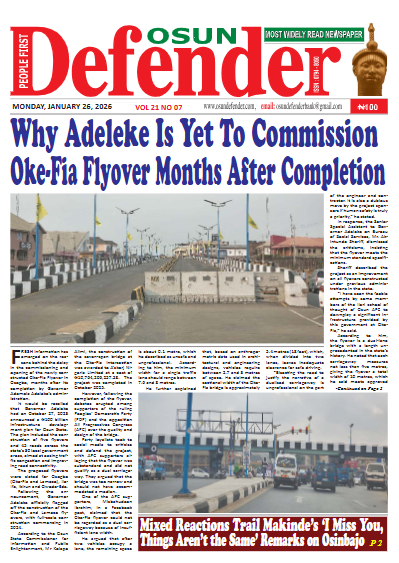EDITORIAL: Food Security Threat And Opportunity

MUCH ado has been made about a blockade of agricultural produce from the Northern part of the country to the South. We have also read unverified reports about the diversion of produce to neighbouring countries in order to develop new markets as opposed to sending produce to the Southern part of Nigeria. Whatever happens, as usual with Nigeria, never goes the mile after a few skirmishes.
There are, however, important issues involved, particularly for the South-West zone. We should recall the Chinese ideogram for Crisis – one side is danger, the other is opportunity. Whatever is playing out should be turned into an opportunity for the zone to reevaluate its agriculture initiatives and programmes and put food security on the front burner.
In doing so, there is no need to reinvent the wheel. Far-sighted governments in the Western Region in the nineteen fifties and sixties had clear strategic imperatives about food security and were on their way towards achieving it.
A clear emphasis was the transition of the peasantry out of subsistence farming into the mechanised and industrial state. To achieve this, the Cooperative Bank was established in 1953. In addition, the region created the Western Nigeria Marketing and Commodity Boards to ensure price stability and elevate living standards, through minimum farm gate price guarantees, provision of storage facilities, improved seedlings, mechanisation, training and retraining. Under the oversight of very imaginative regional agriculture ministers, starting with Chief Gabriel Akin – Deko, a significant advance was made. For example, by the mid-sixties, grandparent stock for cattle had already emerged in ranches in the region. It should have been sustained.
In the present circumstances, we have to review and update the manual. There is frankly no alternative. The agriculture value chain must be revamped for food security and developed to feed industrial production. The zone needs region-wide commodity exchanges and specialist lenders which can be induced using the present regional integration platforms.
The immediate past administration in the State of Osun for example, through its widely-acknowledged O – REAP Programme, made efforts to exploit the more than N10 billion daily food market in Lagos; and even offered farmers free train service to deliver their goods in Lagos. They also made efforts to provide 5 million plantain suckers to farmers. This is similar with yam, cassava and potatoes.
Efforts were also made to re-establish the Oloba Cattle Ranch.
The anchor grower schemes were promoted to provide agric produce for the O – Meal scheme, while vast arable land was provided to an intended partnership with Lagos State on growing food. Similar attempts were put forth to set up a seed and farm supplies distribution framework in Osun to make life easy for farmers.
These efforts need to be reviewed to deliver the vision of abundant food and wealth to the South-West states.
A warning has been inadvertently fired. It’s wake up time on the food security front.









